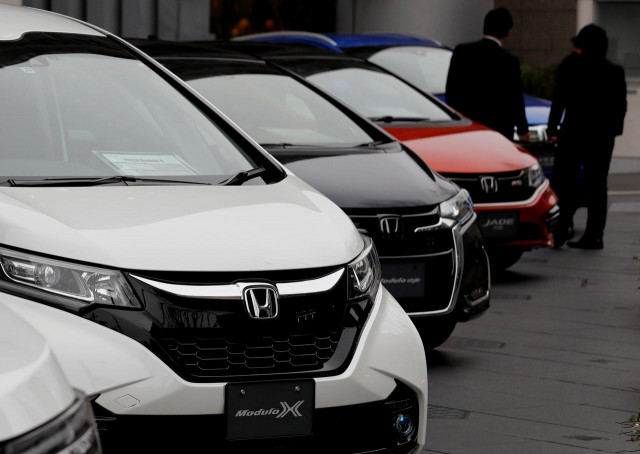Why palm-greasing essential for buying new car?
The reason is simple: you can’t get timely delivery of the car on its original price

Buying a car is one thing but getting the car on time is a different ballgame.
The reason is simple: you can’t get timely delivery of the car on its original price without paying premium to the dealers.
Issues pertaining to bookings of new cars in dealers’ name and additional earnings from re-selling cars at a premium right after buying them were discussed, among other things, in the Express News talk show – The Review – on Friday night.
The hosts – Kamran Yousaf and Shahbaz Rana – examined the issue of how dealers book cars in their names in bulk and then resell to buyers by charging more than the original price of the vehicle.
They also took a critical view of the recently made decision of the Economic Coordination Committee (ECC) of the Cabinet through which the government has approved the levy of an additional withholding tax of up to Rs200,000 on sale of newly-bought cars within three months of purchase.
During the show, Rana, while sharing that roughly 200,000 cars are sold in a year and the approximately 66,000 cars were sold in the last five months, said that the auto manufacturing and selling sector was not as huge as some of the other sectors yet the government was unable to properly regulate it.
“How long consumers will suffer because of the nexus between car assemblers and the ministry of industry,” he questioned. He said that it was a failure on part of the government but the buyers were the ones suffering.
Yousaf raised questions on quality of the vehicles as well as the absence of world-class safety features, saying that no one was taking notice of such crucial issues.
Apart from auto dealers’ premium money, the hosts discussed the government’s decision to increase electricity prices to fulfil a major condition of the International Monetary Fund (IMF) for the revival of $6 billion programme, which remained suspended for last 10 months.
Following the decision, the electricity prices could go up by 25% or Rs3.34 per unit on account of annual base tariff increase of the previous fiscal year. Senior journalist Khaleeq Kiani commented that the government has already announced package for the industry and it is likely that the additional burden will be shifted to the consumers.
Responding to a question, Kiani said that the IMF was the least interested in how the government managed things, saying all it cared was about numbers. He pointed out that the power companies were being run without CEOs and the officials concerned were compelled to look to the ministries concerned for every decision. He stressed the need for reducing losses and improving recovery, saying both the things were linked with better governance structure.
On the government’s performance, Kiani said that negotiations with the IPPs and reduced rate of return for public sector companies could be counted as achievements but consumers didn’t get anything except hollow promises.
Also, the hosts discussed the recent visit by a delegation of the Taliban Political Commission (TPC), headed by Mullah Abdul Ghani Baradar, to Pakistan for consultations on the ongoing Afghan peace process.
Yousaf shared insight on the 20-day break in the intra-Afghan, saying the US has expressed its concerns but the Afghan Taliban and the Afghan government have adopted a policy of wait and watch until Joe Biden takes oath. He revealed that the Taliban have so far refused to agree to a ceasefire and are pressing for an interim government in Kabul.

1724319076-0/Untitled-design-(5)1724319076-0-208x130.webp)

















COMMENTS
Comments are moderated and generally will be posted if they are on-topic and not abusive.
For more information, please see our Comments FAQ